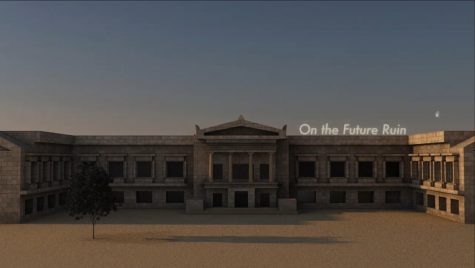Review: Furen Dai shines in ‘Dream Boston’ art exhibit
April 3, 2021
The “Dream Boston” art exhibit, currently open to Northeastern students, faculty and staff at Gallery 360, showcases art at the intersection of the COVID-19 pandemic, systemic racial issues and Bostonian culture.
While every contributing artist offers a unique message and perspective to this immersive and dystopian artistic experience, Furen Dai most successfully conveys the themes of the exhibit.
An illuminating piece of hers is “How was Race Made?” The work is made of vinyl, a synthetic plastic material often used for wallpapers and records, and it “materializes the shifting of forms of difference encoded in and through the U.S. census over time,” according to the work’s description.
“How Race was Made?” details differences in the U.S. census starting from 1850 and ending in 2020. The only words to describe “color” were “white,” “Black” and “Mulatto,” in 1850. By 2020, however, the words to describe “race” expanded over fourfold. As the list of terms grows, they wrap around the vinyl and create a larger image vaguely resembling a square-shaped spiral.
The piece places the racial terms in rectangular, vinyl boxes whose varying colors appear arbitrary. The colors of the racial blocks for each decade range from neutrals to more vibrant colors. These blocks are layered on top of a larger, transparent base vinyl with a neon-yellow color. With such a colorful work of art, one may wonder the significance behind the color choices. While the randomness of the work’s color scheme is visually jarring, it successfully emphasizes the growth of terms over time by making each decade distinct.
An interesting observation about this piece is the appearance and disappearance of the words “Negro” and “color” over time. Seeing the metamorphosis of identity-related vernacular underscores the complex evolution of race perception in the United States.
These developments spur curiosity about the evolution of race-related semantics in the United States. What historical developments influenced the shift from “Black” to “Negro” in the census? Likewise, how did the meaning change to encourage the disappearance of “Negro” completely?
While “How Race was Made?” provides insight into the development of an American understanding of race, it seems to raise more questions than it answers.
Ultimately, the piece tells a story of increased understanding and inclusivity of those different from ourselves. Although “How Race was Made?” raises many questions about the past, it still fosters feelings of hope for the future. Our society still struggles with racial justice and equality, but “How Race was Made?” is a promising visual representation of a world where both our words and actions are just and inclusive.
While most works of art focus on either the pandemic, racial issues or Bostonian culture individually, the exhibit’s final piece, “Future Ruin,” a video created by Dai, manages to gracefully combine all three.
The work displays a computerized version of the Museum of Fine Arts, or MFA, completely empty and devoid of art. It explained how the “early twenty-first century” pandemic wreaked havoc on businesses. So, to maintain public health, places like museums, where thousands of people often gather simultaneously, were forced to close down.
In this dystopian universe, where the MFA is nothing more than an artifact of Bostonian culture, the narrator explains how the museum “used to be” home to more than 500,000 pieces of art from across the globe.
The video shows various rooms of the MFA while defining their respective purposes. It emphasizes how the museum dedicates a majority of its space to European art, where lighting is abundant and ceilings are high and open. Art from Asia and Africa, however, is squeezed onto just one floor, where the lighting is dim and the ceilings are low.
This reflects the disproportionate value placed on white accomplishments and depicts all other ethnic groups as less appreciated artists. Seeing inequality take form in this way is disheartening, but it is impressive that Dai’s work manages to convey such an important message through the architectural structure of a building.

“Future Ruin” is the only piece in “Dream Boston” that directly addresses the pandemic, albeit through a futuristic and dystopian narrative perspective. Because of this, it is easy to emotionally connect to the piece as we continue to experience the pandemic’s tragic consequences.
Although the MFA is currently open for business, many may still feel uncomfortable going to a place that attracts so much foot traffic. “Future Ruin” fosters feelings of longing for a time when we didn’t feel paranoid to step into a crowded room. The video, however, doesn’t only produce somber emotions. In fact, it embodies one of the pandemic’s most valuable lessons: appreciation. Once the pandemic eventually comes to an end, sights of artistic and cultural excellence will be much more appreciated and, hopefully, not taken for granted.
The haunting and eye-opening nature of “Future Ruin” sets Furen Dai apart from other artists. Dai’s incorporation of interesting facts about the MFA’s capacity size and annual visitations, for instance, makes her art more informative and engaging than other pieces in “Dream Boston.”
Dai’s art makes clear and focused arguments, and it leaves the spectator illuminated regardless of personal interpretation by presenting facts in a creative and visual way. “How Race was Made?” and “Future Ruin” speak directly to racial issues and the pandemic respectively. As such, her work leaves the spectator knowing more than before visiting the exhibit.
The captivating, insightful and thought-provoking nature of Furen Dai’s artwork is worthy of extra praise and attention.
“Dream Boston” will be on view until April 11.
This story was updated at 4:39 p.m. April 26 to change the featured image.












